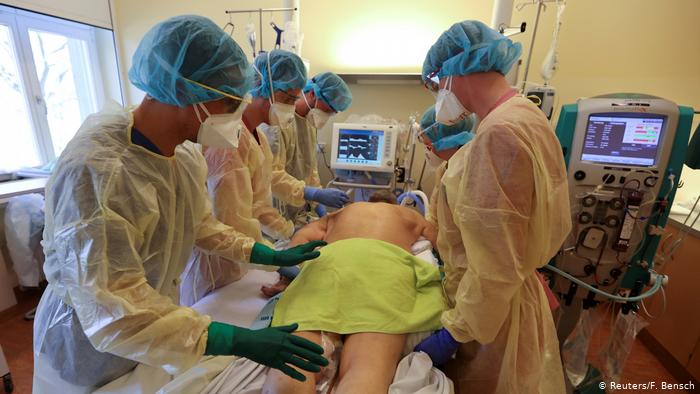Germany's top intensive care expert has said hospitals need to make sure they have enough resources to treat an expected influx of Covid-19 patients.
German ICUs have added nearly 2,000 Covid-19 patients in four weeks.
As the number of Covid-19 cases continues to surge across Germany, hospitals are under pressure to prepare for treating severely ill patients.
Staff in many hospitals in Germany are currently "working at the limits of their capacity," Uwe Janssens, President of the Interdisciplinary Association for Intensive Care and Emergency Medicine (DIVI), told a press conference on Tuesday.
Speaking alongside German Health Minister Jens Spahn, Mr. Janssens urged hospitals in regions with high infection numbers to "end normal operations as soon as possible."
"Where it is medically justified, procedures must be halted and postponed," Janssens said, adding hospitals need to conserve resources.
Although Germany currently has enough beds and ventilators available nationwide, Janssens said a "key problem" would be the lack of medical personnel to treat patients needing treatment like anesthesia and ventilation.
More coronavirus patients in intensive care
According to the latest numbers from DIVI's register of intensive care beds in Germany, there are currently around 7,230 free intensive care beds across Germany out of a total of more than 28,700.
On November 3, there were 2,388 Covid-19 patients receiving intensive care treatment in Germany, with that number currently rising every day, and adding nearly 2,000 patients since October 3. More than half of those cases are receiving invasive ventilation, according to DAVI.
A nationwide partial lockdown began Monday in Germany. On Tuesday, Germany added over 15,350 Covid-19 cases, according to the Robert Koch Institute.
Regional differences
Spahn, who recently recovered from a Covid-19 infection, said the situation in Germany was "serious," albeit with large regional differences.
The percentage of Covid-19 patients occupying intensive care beds ranges from 18% in Berlin to less than 3% in Saxony-Anhalt and Schleswig-Holstein, according to DAVI.
During the first wave of coronavirus in the spring, the German government ordered hospitals to delay non-emergency procedures and operations. Such a blanket order has not yet been reissued, and Spahn said Tuesday that a decision requiring hospitals to redirect resources rests with the leaders of Germany's 16 federal states.
Spahn added that he agreed with Janssens that it was "very important" to delay operations when medically possible, adding that Berlin would provide hospitals with support to deal with the crisis.
"No clinic should be economically disadvantaged because of the coronavirus," he said.
Latest Stories
-
French for health: A new initiative by French Embassy in Ghana
6 hours -
Ghana slowly retracing steps back to path of macroeconomic stability – Deloitte
6 hours -
Ghana’s debt service-to-revenue ratio reached all-time high of 127% in 2020, highest in SSA – IMF
6 hours -
Ghana’s consolidation efforts under IMF progamme to continue to be based on revenue
7 hours -
GPL 2024/25: Hearts beat 3-1 Chelsea to return to winning ways
8 hours -
Ghana set to host second Flag All-Star Game in Accra
8 hours -
Angor CREMA: Empowering Ghana’s coastal communities for sustainable growth
9 hours -
The Legon VC… and childhood memories
9 hours -
The absurd inequality of climate work: Overcoming dilemmas in the green transition
10 hours -
ORAL team receives first dossier of ¢500m National Service ghost names scandal
10 hours -
AfroFuture’s Culture Beach Jam comes off Dec. 28 & 29
10 hours -
NDC gov’t to address first quarter expenditure after January 7 – Ato Forson to Ghanaians
10 hours -
Man sentenced to 5 years for vandalism at Parliament
11 hours -
Art for development: Isaac Koney tells his story
11 hours -
“I prayed for it” – Lady appreciates Joy Prime, Peace Bridals for free wedding gown
11 hours

